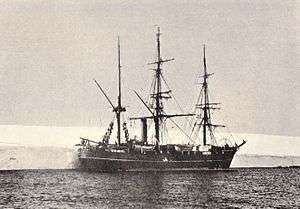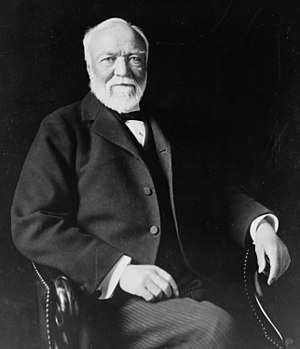January 1902
| << | January 1902 | >> | ||||
|---|---|---|---|---|---|---|
| Su | Mo | Tu | We | Th | Fr | Sa |
| 1 | 2 | 3 | 4 | |||
| 5 | 6 | 7 | 8 | 9 | 10 | 11 |
| 12 | 13 | 14 | 15 | 16 | 17 | 18 |
| 19 | 20 | 21 | 22 | 23 | 24 | 25 |
| 26 | 27 | 28 | 29 | 30 | 31 | |

January 30, 1902: Scott's Discovery Expedition reaches the Great Ice Barrier in Antarctica
The Carnegie Institution

January 28, 1902: Andrew Carnegie endows the Carnegie Institution for Science
January 1, 1902 (Wednesday)
- The first college football bowl game, the "Tournament of Roses East–West Football Game", was held in Pasadena, California, pitting the unbeaten and unscored upon University of Michigan Wolverines against the once-defeated (3-1-1) Stanford University Indians. Michigan, the first of the "Point-a-Minute" football teams coached by Fielding H. Yost, had beaten all of its opponents by an average score of 50 to 0 in its regular season games (501 points in 10 games), and was leading Stanford, 49 to 0, when the game was stopped eight minutes early. A crowd of 8,500 people attended at Tournament Park [1] The annual New Year's Day bowl is referred to now as the Rose Bowl.
- The Nurses Registration Act 1901 came into effect in New Zealand, the first nation in the world to require state registration of nurses.
- An earthquake of magnitude 7.0 struck the Fox Islands in the U.S. Alaskan Territory.[2]
- Several smaller railways combined to form the Swiss Federal Railways.[3]
- Born: Buster Nupen, South African cricketer, in Alesund, Norway (died 1977)
- Died: Bertha Elisabeth Schippan, 13, Australian girl, victim of the "Towitta murder"; the perpetrator was never identified.[4]
January 2, 1902 (Thursday)
- Born: Dan Keating, Irish republican, longest-surviving veteran of the Irish War of Independence, in Castlemaine, County Kerry (died 2007)[5][3]
January 3, 1902 (Friday)
- Miss Alice Roosevelt, the oldest daughter of U.S. President Theodore Roosevelt, was "formally presented to Washington society" at a ball at the White House, a month before her 18th birthday.[3]
January 4, 1902 (Saturday)
- Tzu Hsi, the Empress Dowager of China, issued an imperial edict directing her subjects to resume friendly relations with foreign diplomatic personnel in Beijing.[3]
- Martial law was declared in Barcelona by the government of Spain after labor strikes began.[3]
- The Panama Canal Company offered to sell its property rights, franchises and equipment to the United States government for $40,000,000.[3]
January 5, 1902 (Sunday)
- Mrs. Warren's Profession, a controversial play dealing with prostitution, written by George Bernard Shaw in 1893, was performed for the first time, privately, at the New Lyric Club in London.[6][3]
January 6, 1902 (Monday)
- Nineteen people were killed in a collision between a British ship and a Spanish ship off of the coast of Portugal.[3]
- Died: Jean de Bloch (Ivan Stanislavovich Blokh), 67, Polish-born Russian industrialist and political scientist who wrote about the future of warfare
January 7, 1902 (Tuesday)
- By a margin of only 394 votes, Republican Montague Lessler defeated Democrat Perry Belmont to fill a vacancy for the U.S. representative seat for the normally Democrat Seventh New York District.[3]
- Died:Edward Clark, 79, Architect of the Capitol since 1865, who oversaw the completion of the U.S. Capitol dome and technological improvements including the addition of electricity, steam radiators and elevators.
January 8, 1902 (Wednesday)
- A train collision inside the New York Central Railroad's Park Avenue Tunnel killed 17 people and injured 38— mostly by scalding from a ruptured boiler [3]— leading to increased demand for electric-powered trains and to the banning of steam locomotives in New York City.
- José Santos Zelaya was re-elected as President of Nicaragua for a second four-year term.[3]
- Died:
- Marcellus Hartley, 74, American weapons manufacturer who owned the Remington Arms Company
- General Francis J. Herron, 64, Union Army commander and Medal of Honor winner who died in poverty after his retirement
January 9, 1902 (Thursday)
- The Discovery Expedition, an exploration voyage led by Captain Robert Falcon Scott, arrived at Cape Adare on the eastern side of Antarctica. Other members of the expedition included Ernest Shackleton, Tom Crean, Frank Wild and Edgar Evans.
- The U.S. House of Representatives voted, 307 to 2, in favor of the bill to construct the Nicaragua Canal.[3]
- Born:
- Sir Rudolf Bing, Austrian-born opera manager, in Vienna (died 1997)
- Josemaría Escrivá, Spanish priest and Catholic saint, in Barbastro (died 1975)
- Ann Nixon Cooper, African-American civil rights activist, in Shelbyville, Tennessee (died 2009)
January 10, 1902 (Friday)
- New Zealander Ellen Dougherty became the world's first registered nurse.[7]
- A German record for the longest balloon flight was set by meteorologist Arthur Berson and balloonist Hermann Elias, when they completed a 30-hour journey of 913 miles (1,469 km) (913 miles) from Berlin in the German Empire, to Poltava in the Russian Empire.
- The German imperial government announced that Friedrich Alfred Krupp, the owner and operator of the Krupp Arms Manufacturing Company, was the wealthiest man in the German Empire, with an annual income of 20,000,000 marks (equivalent to USD $5,000,000 in 1902 and more than $150 million or €135 million per year in 2019) l.[3]
January 11, 1902 (Saturday)
- Born: Maurice Duruflé, French composer, in Louviers (died 1986)
- Died:
- Johnny Briggs, 39, English cricketer, from an epileptic seizure [8]
- Horace Scudder, 63, American journalist, historian and children's author, known for being editor of The Atlantic Monthly and for the standard American school textbook A History of the United States of America
January 12, 1902 (Sunday)
- The Uddevalla Suffrage Association, a Swedish political movement, was officially dissolved after twelve years of activity.[9]
- Born: King Saud of Saudi Arabia, in Kuwait City (died 1969)
January 13, 1902 (Monday)
- What one author describes as "the first wave of Korean immigration" to the United States [10] began with the arrival of the steamer S.S. Gaelic in the U.S. Hawaii Territory, carrying 102 emigres from the Kingdom of Korea. Over the next three years, a total of 7,291 Korean laborers would arrive by ship to work in Hawaiian sugar plantations, until Japan's assumption of protectorate status over Korea and the closing off of emigration.
- Friedrich Delitzsch, a professor of Assyriology at the University of Berlin, began his series of controversial lectures that he titled Babel und Bibel, referring to the ancient Kingdom of Babylon (called "Babel" by the ancient Hebrews) and the Bible. Delitzsch advanced his theory, based on his own research archaeological research of ancient cuneiform records, that Judaism and the Old Testament were derivative of Steven L. Danver, Babylonian culture Popular Controversies in World History: Investigating History's Intriguing Questions [4 volumes]: Investigating History's Intriguing Questions (ABC-CLIO, 2010)
- Born: Karl Menger, Austrian-born American mathematician who postulated Menger's theorem; in Vienna (d. 1985)
January 14, 1902 (Tuesday)
- Arthur P. Gorman was elected as the U.S. Senator for Maryland by the Maryland state legislature.[3]
January 15, 1902 (Wednesday)
- Fifteen of the 16 nations meeting at the Pan-American Congress in Mexico City, including the United States, signed their agreement to recognize the principles of compulsory arbitration of international disputes as outlined in the Hague Convention.[3] Chile announced earlier that it would withdraw from the Pan-American Congress if compulsory arbitration was adopted.
- Joseph B. Foraker was elected as the U.S. Senator for Ohio by the Ohio state legislature.[3]
- Born: Nâzım Hikmet, Turkish poet, in Salonica, Ottoman Empire (died 1963)
- Died: Alpheus Hyatt, 63, American zoologist and paleontologist
January 16, 1902 (Thursday)
- A earthquake of magnitude 7.0 struck Chilpancingo, the capital of the Guerrero state in, Mexico l.[3] Despite the severity of the quake, only two people were killed and two injured.[11]
- Underground public toilets are opened at Amagertorv, a central square in Copenhagen, Denmark.[12]
- Born: Eric Liddell, Scottish athlete, in Tianjin in China (died 1945)
January 17, 1902 (Friday)
- The Times Literary Supplement was published for the first time, as an addition to London's venerable daily newspaper, The Times
- Almost two years before the first flight by the Wright Brothers, German-born U.S. aviator Gustave Whitehead claimed to have made two notable flights over Long Island Sound in a heavier-than-air, 40 hp- 29.9-kW- engine-powered flying machine with wheels and an amphibious boat-shaped hull.[13]
January 18, 1902 (Saturday)
- Died:
- Ellis Ashmead-Bartlett, 52, U.S.-born British politician who had served in the House of Lords for more than 20 years
- Gideon Scheepers, 23, a leader of raids by the Orange Free State into the Britain's Cape Colony during the Anglo-Boer War in South Africa, was executed by a British Army firing squad.
January 19, 1902 (Sunday)
- Died: Maria Cristina, 68, Infanta of Portugal and Spain
January 20, 1902 (Monday)
- Carlos Albán, Colombian inventor and that nation's Governor of the province of Panama, was killed when insurgents sank the ship that he was commanding, the Lautaro.[14]
- Born:
- Kevin Barry, Irish republican, in Rathvilly, County Carlow (died 1920)
- Leon Ames, American actor, in Portland, Indiana (died 1993)
- Died:
- Camilla Urso, 61, French child prodigy and violinist
- Cornelius A. Cadmus, 57, former U.S. Congressman for New Jersey
January 21, 1902 (Tuesday)
- The Senate of France voted, 184 to 53, to approve a decree the abolished compulsory attendance at Roman Catholic mass for members of the French Navy.[14]
- U.S. Navy Rear Admiral Winfield Scott Schley appealed to U.S. President Theodore Roosevelt from the findings of a Navy Court of Inquiry regarding actions during the Battle of Santiago de Cuba.[15][14]
- William H. Taft returned to the United States after completing his service as the U.S. Governor-General of the Philippines.[14] Taft would be elected President of the United States in 1908.
- Died: Dr. Hugo von Ziemssen, 72, German physician and pioneer in electrotherapeutics and treatment of anemia
January 22, 1902 (Wednesday)
- Born: Daniel Kinsey, U.S. Olympic hurdler, in St Louis (died 1970)
January 23, 1902 (Thursday)
- A snowstorm killed 199 Imperial Japanese Army soldiers who were on a training exercise in the Hakkōda Mountains, on the island of Honshu. It remains the largest disaster in the history of mountaineering.[16]
- The Baghdad Railway Convention was signed in Constantinople between the Ottoman Empire and Britain.[14]
- Australia defeated England by 4 wickets in the 3rd cricket test match at the Adelaide Oval.[17]
January 24, 1902 (Friday)
- The Danish West Indies were ceded to the United States by the Kingdom of Denmark as representatives from both nations signed a treaty in Washington.[14] The area is now the United States Virgin Islands.
- Twenty coal miners were killed, and 14 seriously injured, in an explosion at the Lost Creek Mining Company Number 2 mine in Mahaska County, Iowa.[14] Coal miners across the state went on strike in order to force the enactment of stricter safety laws.
- King George of Greece survived an assassination attempt.[14]
- Born: Ephraim Avigdor Speiser, American archaeologist and biblical scholar, in Skalat, Galicia, now Ukraine (died 1965)
January 25, 1902 (Saturday)
- General Benjamin Viljoen of the South African Republic Army was taken prisoner of war by the British Army near Lydenburg.[14]
- Born:
- André Beaufre, French general, in Neuilly-sur-Seine (died 1975)
- Pablo Antonio, Filipino modernist architect, in Manila (died 1975)[18]
January 26, 1902 (Sunday)
- Born: Menno ter Braak, Dutch author and polemicist, in Eibergen (died 1940)
- Died: General Harrison C. Hobart, 86, Union Army officer who led the successful escape of 109 prisoners of war from the Libby Prison camp in Richmond, Virginia during the American Civil War in 1864
January 27, 1902 (Monday)
- General Manie Maritz of the South African Republic and his party of soldiers were attacked by a group of coloured residents of Leliefontein, in the north of Britain's Cape Colony, to ask questions of the Methodist missionaries there. Martiz retreated, then came back the next day and carried out the Leliefontein massacre, summarily shooting or bludgeoning at least 30 members of the population in retaliation for the offense [19]
January 28, 1902 (Tuesday)
- The Carnegie Institution was founded in Washington, D.C., with funding from a USD $10 million grant from Andrew Carnegie.
- The Austrian capital of Vienna converted to an all-electric streetcar system, as the last of the horse-drawn railcars was retired.[14]
- Two months after making the successful circumnavigation of the Eiffel Tower by air, Alberto Santos-Dumont made two successful tests of his faster maneuverable airship at Monte Carlo.[14]
- Died:
- Eugene du Pont, 61, American businessman and President of the DuPont Company as the largest supplier of gunpowder to the U.S. Army. Following his death, his three nephews would build the company into a worldwide chemical conglomerate.
- Rear Admiral Lewis A. Kimberly, 71, United States Navy officer and former commander of the Navy's Pacific Squadron during the 19th century
January 29, 1902 (Wednesday)

- The birthday of William McKinley, the late U.S. President, was observed across the United States for the first time since his assassination in September.[20] For several decades, McKinley's birthday, though not a holiday, would be observed as "Carnation Day" [21] because the 25th U.S. President had traditionally worn a red carnation in the lapel [22] Although the tradition would fade after McKinley's 100th birthday in 1943,[23] the event was informally observed as late as 2017.[24]
January 30, 1902 (Thursday)
- The Discovery Expedition discovered previously-uncharted land at the eastern extremity of the Great Ice Barrier, as predicted by James Clark Ross. The land was christened King Edward VII Land.[25]
- A doublet earthquake struck the east coast of Aomori Prefecture, Honshu, Japan.[26]
- At Lansdowne House, London, Britain's foreign secretary and Japan's Minister to the United Kingdom signed the Anglo-Japanese Alliance, bringing an end to the UK's policy of "splendid isolation".[27]
- Died:
- Sanders D. Bruce, 76, prominent American horse breeder and journalist
- François Claude du Barail, 81, former French Minister of War
January 31, 1902 (Friday)
- The British government announced that the casualties in the Second Boer War after more than two years of fighting was 100,701 soldiers and 5,240 officers who had been killed or wounded.[14]
- Born:
- Tallulah Bankhead, U.S. actress, in Huntsville, Alabama (died 1968)
- Alva Myrdal, Swedish politician, diplomat, and writer, recipient of the Nobel Peace Prize, in Uppsala (died 1986)
gollark: The eternal question.
gollark: Valentine's day will be filled with secret robots too.
gollark: You can hoard them, just not hoard CBs.
gollark: They remind me somehow of an ostrich.
gollark: Alas, as BlueLatios said, someone else thought of that.
References
- Maxwell Stiles – The Rose Bowl: A Complete Action and Pictorial Exposition of Rose Bowl Football, Sportsmaster Publications (1946), ASIN: B0007FBNU4
- "Centennial Earthquake Catalog". United States Geological Survey. 1 January 1902. Retrieved 16 November 2015.
- The American Monthly Review of Reviews (February, 1902), pp150-154
- Lynton Grace (14 January 2014). "South Australia's most notorious unsolved crimes and mysteries". The Advertiser. Retrieved 21 January 2016.
- "Irish Civil War veteran dies at 105". BBC News. 3 October 2007. Retrieved 6 October 2007.
- Williams, Hywel (2005). Cassell's Chronology of World History. London: Weidenfeld & Nicolson. pp. 460–461. ISBN 0-304-35730-8.
- Openshaw, M. G. Dougherty, Ellen 1844 – 1919. Dictionary of New Zealand Biography, updated 7 April 2006
- Owen, W. B. (1912). . Dictionary of National Biography (2nd supplement). London: Smith, Elder & Co.
- Karlson, Gustaf E. (1977). Föreningar i Uddevalla (in Swedish). Uddevalla: Uddevalla Kulturnämnd. pp. 58–59.
- Kent E. Calder, Asia in Washington: Exploring the Penumbra of Transnational Power (Brookings Institution Press, 2014) p315
- "19020116 MEXICO: GUERRERO". National Geophysical Data Center. 16 January 1902. Retrieved 16 November 2015.
- "1902". Selskabet for Københavns Historie. Archived from the original on 1 March 2009. Retrieved 20 January 2010.
- "1902 – Letters to American Inventor from G. Whitehead". Gustave Whitehead's Flying Machines. 17 January 1902. Archived from the original on 3 August 2013. Retrieved 28 May 2011.
- The American Monthly Review of Reviews (March, 1902), pp. 281-285
- Langley, Harold D. (1993). Bradford, James C., ed. "Winfield Scott Schley and Santiago: A New Look at an Old Controversy". Annapolis, MD: Naval Institute Press. p. 89.
- Death March on Mount Hakkōda. Google Books. Retrieved on November 10, 2008.
- "England tour of Australia, 3rd Test: Australia v England at Adelaide, Jan 17–23, 1902". cricinfo. Retrieved 21 January 2017.
- "Culture Profile: Pablo Antonio". National Commission for the Culture and Arts. Archived from the original on 17 March 2008. Retrieved 12 April 2008.
- Andre Wessels, The Anglo-Boer War 1889-1902: White Man's War, Black Man's War, Traumatic War (Sun Press, 2010) p125
- "M'Kinley's Birthday— Chicago and Other large Cities Observe the Occasion in Fitting Manner— National Holiday Suggested", Alton (IL) Telegraph, January 30, 1902, p1
- "'Twas Carnation Day— Those Who Remembered McKinley's Birthday Caused a Demand for the Flower", Minneapolis Journal, January 29, 1903, p6
- "This is Carnation Day— President McKinley's Birthday to Be Recognized by Flower", Brooklyn Daily Eagle, January 29, 1911, pS-6
- "House Members Honor McKinley On Birthday Eve", Baltimore Sun, January 29, 1943, p3
- "Ohio Statehouse remembers McKinley with carnation day", Washington Times, January 30, 2017
- Preston, Diana (1999). A First Rate Tragedy: Captain Scott's Antarctic Expeditions (paperback ed.). London: Constable. ISBN 0-09-479530-4. OCLC 59395617.
- "Centennial Earthquake Catalog". United States Geological Survey. 30 January 1902. Retrieved 16 November 2015.
- "a home away from home – since 1935". The Lansdowne Club. Archived from the original on 13 May 2010. Retrieved 5 May 2010.
This article is issued from Wikipedia. The text is licensed under Creative Commons - Attribution - Sharealike. Additional terms may apply for the media files.